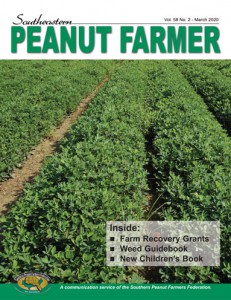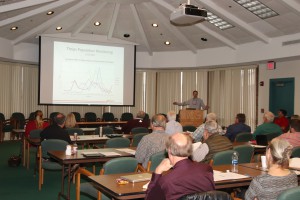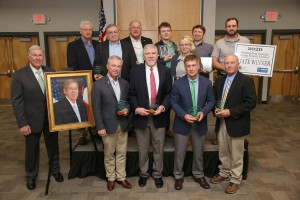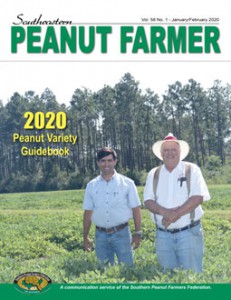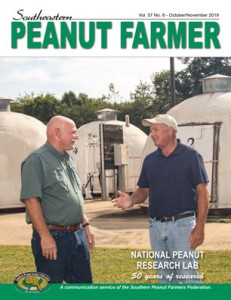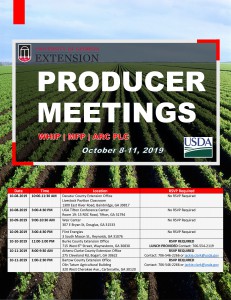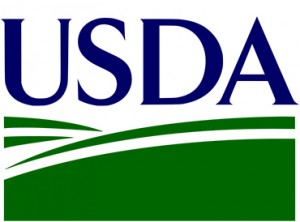 WASHINGTON, D.C., Sept. 9, 2019 – U.S. Secretary of Agriculture Sonny Perdue today announced that agricultural producers affected by natural disasters in 2018 and 2019, including Hurricane Dorian, can apply for assistance through the Wildfire and Hurricane Indemnity Program Plus (WHIP+). Signup for this U.S. Department of Agriculture (USDA) program will begin Sept. 11, 2019.
WASHINGTON, D.C., Sept. 9, 2019 – U.S. Secretary of Agriculture Sonny Perdue today announced that agricultural producers affected by natural disasters in 2018 and 2019, including Hurricane Dorian, can apply for assistance through the Wildfire and Hurricane Indemnity Program Plus (WHIP+). Signup for this U.S. Department of Agriculture (USDA) program will begin Sept. 11, 2019.
“U.S. agriculture has been dealt a hefty blow by extreme weather over the last several years, and 2019 is no exception,” Perdue said. “The scope of this year’s prevented planting alone is devastating, and although these disaster program benefits will not make producers whole, we hope the assistance will ease some of the financial strain farmers, ranchers and their families are experiencing. President Trump has the backs of our farmers, and we are working to support America’s great patriot farmers.”
More than $3 billion is available through the disaster relief package passed by Congress and signed by President Trump in early June. WHIP+ builds on the successes of its predecessor program the 2017 Wildfire and Hurricane Indemnity Program (2017 WHIP) that was authorized by the Bipartisan Budget Act of 2018. In addition, the relief package included new programs to cover losses for milk dumped or removed from the commercial market and losses of eligible farm stored commodities due to eligible disaster events in 2018 and 2019. Also, prevented planting supplemental disaster payments will provide support to producers who were prevented from planting eligible crops for the 2019 crop year.
Eligibility
WHIP+ will be available for eligible producers who have suffered eligible losses of certain crops, trees, bushes or vines in counties with a Presidential Emergency Disaster Declaration or a Secretarial Disaster Designation (primary counties only). Disaster losses must have been a result of hurricanes, floods, tornadoes, typhoons, volcanic activity, snowstorms or wildfires that occurred in 2018 or 2019. Also, producers in counties that did not received a disaster declaration or designation may still apply for WHIP+ but must provide supporting documentation to establish that the crops were directly affected by a qualifying disaster loss.
A list of counties that received qualifying disaster declarations and designations is available at farmers.gov/recover/whip-plus. Because grazing and livestock losses, other than milk losses, are covered by other disaster recovery programs offered through USDA’s Farm Service Agency (FSA), those losses are not eligible for WHIP+.
General Eligibility and Payment Limitations
WHIP+ is only designed to provide assistance for production losses, however, if quality was taken into consideration under federal crop insurance or the Noninsured Crop Disaster Assistance Program (NAP) policy, where production was further adjusted, the adjusted production will be used in calculating assistance under this program.
Eligible crops include those for which federal crop insurance or NAP coverage is available, excluding crops intended for grazing. A list of crops covered by crop insurance is available through USDA’s Risk Management Agency (RMA) Actuarial Information Browser at webapp.rma.usda.gov/apps/actuarialinformationbrowser.
Eligibility will be determined for each producer based on the size of the loss and the level of insurance coverage elected by the producer. A WHIP+ factor will be determined for each crop based on a producer’s coverage level. Producers who elected higher coverage levels will receive a higher WHIP+ factor.
The WHIP+ payment factor ranges from 75 percent to 95 percent, depending on the level of crop insurance coverage or NAP coverage that a producer obtained for the crop. Producers who did not insure their crops in 2018 or 2019 will receive 70 percent of the expected value of the crop. Insured crops (either crop insurance or NAP coverage) will receive between 75 percent and 95 percent of expected value; those who purchased the highest levels of coverage will receive 95-percent of the expected value.
Once signup begins, a producer will be asked to provide verifiable and reliable production records. If a producer is unable to provide production records, WHIP+ payments will be determined based on the lower of either the actual loss certified by the producer and determined acceptable by FSA or the county expected yield and county disaster yield. The county disaster yield is the production that a producer would have been expected to make based on the eligible disaster conditions in the county.
WHIP+ payments for 2018 disasters will be eligible for 100 percent of their calculated value. WHIP+ payments for 2019 disasters will be limited to an initial 50 percent of their calculated value, with an opportunity to receive up to the remaining 50 percent after January 1, 2020, if sufficient funding remains.
WHIP+ benefits will be subject to a payment limitation of either $125,000 or $250,000 per crop year, depending upon their verified average adjusted gross income. As under 2017 WHIP, the payment limitation for WHIP+ factors in the person’s or legal entity’s income from activities related to farming, ranching, or forestry. Specifically, a person or legal entity, other than a joint venture or general partnership, cannot receive more than $125,000 in payments under WHIP+, if their average adjusted gross farm income is less than 75 percent of their average adjusted gross income (AGI) for 2015, 2016, and 2017. The $125,000 payment limitation is single total combined limitation for payments for the 2018, 2019, and 2020 crop years. However, if at least 75 percent of the person or legal entity’s average AGI is derived from farming, ranching, or forestry related activities and the participant provides the required certification and documentation, the person or legal entity, other than a joint venture or general partnership, is eligible to receive, directly or indirectly, up to $250,000 per crop year in WHIP+ payments, with a total combined limitation for payments for the 2018, 2019, and 2020 crop years of $500,000. The relevant tax years for establishing a producer’s AGI and percentage derived from farming, ranching, or forestry related activities for WHIP+ are 2015, 2016, and 2017. For information regarding the payment limitation that applies to WHIP+, please contact your local USDA service center or visit farmers.gov/recover.
Future Insurance Coverage Requirements
Both insured and uninsured producers are eligible to apply for WHIP+. But all producers receiving WHIP+ payments will be required to purchase crop insurance or NAP, at the 60 percent coverage level or higher, for the next two available, consecutive crop years after the crop year for which WHIP+ payments were paid. Producers who fail to purchase crop insurance for the next two applicable, consecutive years will be required to pay back the WHIP+ payment.
Additional Loss Coverage
The Milk Loss Program will provide payments to eligible dairy operations for milk that was dumped or removed without compensation from the commercial milk market because of a qualifying 2018 and 2019 natural disaster. Producers who suffered losses of harvested commodities, including hay, stored in on-farm structures in 2018 and 2019 will receive assistance through the On-Farm Storage Loss Program.
Additionally, the disaster relief measure expanded coverage of the 2017 WHIP to include losses from Tropical Storm Cindy, and peach and blueberry crop losses that resulted from extreme cold.
Enhanced Assistance Through Tree Assistance Program (TAP)
TAP traditionally provides cost-share for replanting and rehabilitating eligible trees. WHIP+ will provide payments based on the loss of value of the tree, bush or vine itself. Therefore, eligible producers may receive both a TAP and a 2017 WHIP or WHIP+ payment for the same acreage.
In addition, TAP policy has been updated to assist eligible orchardists or nursery tree growers of pecan trees with a tree mortality rate that exceeds 7.5 percent (adjusted for normal mortality) but is less than 15 percent (adjusted for normal mortality) for losses incurred during 2018.
Prevented Planting
Agricultural producers faced significant challenges planting crops in 2019 in many parts of the country. All producers with flooding or excess moisture-related prevented planting insurance claims in calendar year 2019 will receive a prevented planting supplemental disaster (“bonus”) payment equal to 10 percent of their prevented planting indemnity, plus an additional 5 percent will be provided to those who purchased harvest price option coverage.
As under 2017 WHIP, WHIP+ will provide prevented planting assistance to uninsured producers, NAP producers and producers who may have been prevented from planting an insured crop in the 2018 crop year and those 2019 crops that had a final planting date prior to January 1, 2019.
Other USDA Disaster Recovery Assistance
When major disasters strike, USDA has an emergency loan program that provides eligible farmers low-interest loans to help them recover from production and physical losses.
Livestock owners and contract growers who experience above normal livestock deaths because of specific weather events, as well as from disease or animal attacks, may qualify for assistance under USDA’s Livestock Indemnity Program. Producers who suffer losses to or are prevented from planting agricultural commodities not covered by federal crop insurance may be eligible for assistance under USDA’s Noninsured Crop Disaster Assistance Program if the losses were from natural disasters.
USDA’s Emergency Assistance for Livestock, Honeybees and Farm-Raised Fish Program provides payments to producers of these commodities to help compensate for losses because of diseases (including cattle tick fever) and adverse weather or other conditions, such as blizzards and wildfires, that are not covered by other disaster programs.
USDA also provides financial resources through its Environmental Quality Incentives Program for immediate needs and long-term support to help recover from natural disasters and conserve water resources. Additionally, the Emergency Watershed Protection Program helps local communities immediately begin relieving imminent hazards to life and property caused by floods. In addition, the Emergency Conservation Program provides funding and technical assistance for farmers and ranchers to rehabilitate farmland damaged by natural disasters and help put in place methods for water conservation during severe drought.
For more information on FSA disaster assistance programs, please contact your local USDA service center or visit farmers.gov/recover. For all available USDA disaster assistance programs, go to USDA’s disaster resources website.

